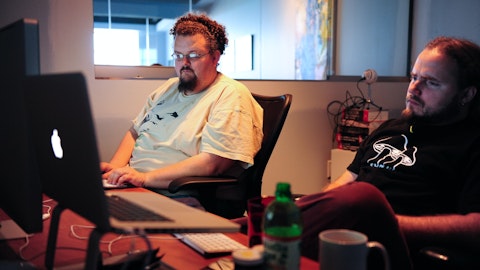Under what conditions does AI make the decision? Under who is responsible? What is the chain of authority? How do you do it while maintaining security, because some of the people using the product may actually be working for the other side? There’s just thousands and thousands of issues here that required years and years of software build, which we are now going to continue to supply to our allies across the world and to our consumer customers. So we’re very, very excited about this, excited about the interest and excited about bringing the fight to our adversaries.
Ana Soro: Thanks, Alex. We received a few questions on SBC and dilution, including one from Christopher, who asks at what point is Palantir hoping to reduce SBC?
Dave Glazer: Thanks, Christopher. We’re laser-focused on SBC and we have been the last few years. If you go back to the quarter that we went public, Q3 of 2020, we had $849 million in that quarter of SBC. You go back to Q4 of 2022, just last quarter it was only $129 million. The last six quarters, we’ve been down sequentially each quarter with our SBC, and 2022 versus 2021 is down 27% year-over-year. Stepping back, the ultimate test around SBC is really like, are you GAAP profitable? And the answer now is yes. It’s yes in Q4. And as we look forward to 2023, the answer is yes there as well. Equity overall, we want to make sure that we align employees and our stockholders. And you sort of see that in the current results, which are all resulting in GAAP profitability. And so we plan to keep that alignment, to push on the top line, improve the margin and to stay GAAP profitable.
Ana Soro: Thanks, Dave. This next question is for you, Ryan. Zachary asks, what are Palantir’s primary goals for 2023?
Ryan Taylor: Thanks, Zachary. We’re planning to keep our heads down, keep doing what we’ve been doing, which means delivering to our customers on their critical missions with an eye towards long-term growth. And what that specifically means is continuing to focus on both top line and bottom line, our revenue growth, adjusted operating margins and delivering on GAAP profitability, as we’ve laid out. In the U.S. commercial space, we grew 67% year-over-year. As I highlighted earlier, we have a lot of strong indicators of momentum going into this year, and we expect to deliver another landmark year in U.S. commercial. In the U.S. government space, we’ll continue doubling down on the backbone of our business, one of our most important customers, which means seeking to accelerate defense, civil and intelligence space.
And obviously, there are factors such as whether or not there’s a continuing resolution that might affect the timing of that, but our long-term outlook on U.S. government is extremely strong. In the international space, we’re looking to grow the defense business outside of the U.S. as our allied countries are looking to deploy the expertise that we’ve owned over 20 years around the world in the most important missions. We’re looking to grow our work in civil. We’re particularly excited about health care and keep our momentum in the U.K. government. And all while doing that, we seek to continue to deliver on GAAP profitability.
Alex Karp: A different version of that is we will maintain our discipline around GAAP profitability precisely because the world is recognizing our crucial contribution to the West. We see this in war. We see this in the commercial areas. We see this in health care. We see this where people are embracing technology, especially in the U.S., especially around AI, especially around AI with security models, in private networks. And so there’s a tethering between our financial discipline and our ability to just continue crushing in the service of what we believe is important, Western institutions and that they survive and drive better than adversarial institutions.
Ana Soro: Thank you, Ryan and Alex. Our next question is from Brent with Jefferies. Brent, please turn on your camera and then you’ll receive a prompt to unmute your line.





